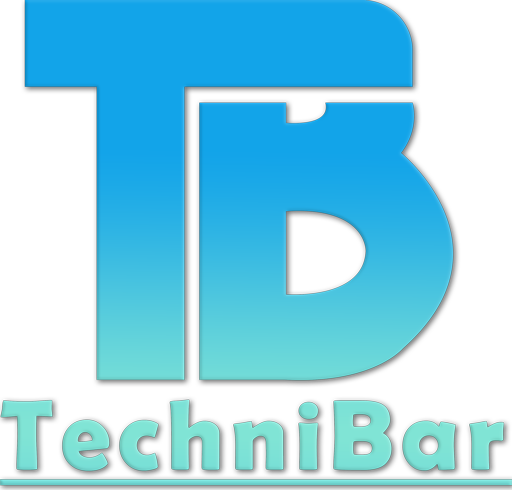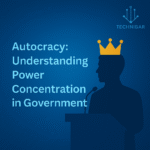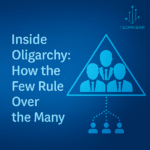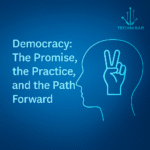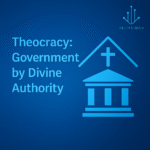As the world is growing more and more technologically demanding and complex. The issue of who should be in charge becomes more urgent than ever. Is it better to elect leaders on the basis of popularity, ideology or based on expertise? This is the question underlying technocracy. The system of government by people whose decision making. owes its position to technical expertise and demonstrated. Competence in their area of interest rather than political partisanship or popular appeal in an electoral vote.
It is a somewhat radical break with the politics of the usual. By insisting that the task of engineering, scientists, economists. Others involved in the field should play an important part in determining public policy. Yet what does technocracy consist of? Does it offer a valid solution to the complex issues, or a risk to the democracy values? This paper presents the meaning, history, main characteristics, strengths, attacks and contemporary relevance of technocracy.
What is technocracy?
Technocracy derives its name with tekhne (skill or art) and kratos (power or rule). In Greek and literally translates to the rule of skillfulness. Complex modern society needs innovative knowledge and rational planning. To get rid of such challenges as climate change, issues of the healthcare system. Infrastructure building and economy management. which are too challenging to discuss them by the present-day career politicians. The appointment of leaders in a technocratic system. It is based on qualification and merit and not through popular vote.
Technocracy background and history
Use of the term technocracy became common. In the early 20th century, Especially after the great depression in the United States. A cadre of engineers, economists and scientists. It headed by such leaders as Howard Scott and Thorstein Veblen. It promoted a new form of economic and political structure. The founded on energy economy and technical competency. They were certain that the intellectual authority of old capitalist and political power. It was defunct and only a skilled expert can effectively handle the economy.
The technocracy movement, Though never established as a formal governance process in the United States. It had an impact in the planning, politics and expert authority discourses.
Major Characteristics of Technocracy
Meritocracy
Leader selection is made on actual education, skills and technical competencies.
Evidence-Based Policy
Science-based data and empirical research are used as the basis of decision-making and not political ideologies.
Efficiency and Optimization
Efficiency and optimization are ingredients desired by technocrats who typically utilize quantitative models and long term sweep planning.
De-politicization
Reduces the impact of political parties and populism in politics.
Sectoral Expertise:
The experts in each sector of the governance are in charge of such areas as health, energy, transportation and economy.
Technocracy in Practice Real World Examples
Technocratic ideologies find their way into several governments and institutions across the globe although no nation is a straight technocracy:
Rigorous education and technical competence by its leaders, such as the first prime minister Lee Kuan Yew, stressed on it. Most of the leading officers have diplomas in law, economics, or engineering and the best institutions in the world.
The Communist Party of China historically puts technocrats into critical positions. Particularly between the 1980s and the beginning of the 2000. A high number of leaders in China were engineers or scientists. This was concomitant with the fast growth of the economy and the development of infrastructure.
The benefits of Technocracy
Informed Decision-Making
Where they tend to be scientific in making policies. The using scientific models and data therefore, leading to a possibly improved outcome.
Long-Term Planning
Technocrats are not restricted by the need to take into consideration. Short-term victory in elections to gain a post in the government, which allows solving problems using sustainable achievements.
Less Corruption and Populism
Technocracy has the capability of cutting partisan squabbling and populism games by prioritizing merit and deploying politics.
Crisis Management
Technocratic rule can be efficacious in times of emergency. When viral outbreaks or financial crises strike, and when decisive action is needed by an expert authority.
Productivity and Reasonableness
Training of technocrats ensures. That they learn how to locate inefficiencies. And take the necessary measures. That would support an effective solution. Which can enhance the quality of services and resource allocation to the citizens.
Objections and warnings of Technocracy
Democratic Deficit
The greatest objection to technocracy is that it has the potential to weaken democratic ideals.
Craze on Technical Solutions
Technocrats can disregard problems related to social, cultural or moral aspects. Data may not end all problems.
Elite Rule
Technocracy is also able to cluster the power to only a few highly-educated people, excluding the voices of ordinary citizens.
Not being transparent
The technocratic institution may be un transparent. It is not accessible to the people. It may be difficult to decipher any of the decisions to challenge it.
Authoritarian Possibility
Technocratic rule in certain situations. It may serve as a front to authoritarianism. With criticism being labelled as being unscientific or irrational.
Technocracy of Modern Time
Technocracy is becoming more applicable in 21 st century. On the one hand, the issues modern societies are having. To deal with are as varied as climate change and AI governance. On the one hand to pandemics and economic instability. On the other Consequently. it has led the governments to seek technocrats to administer. The complex systems, such as appointing. The scientists to head the government agencies. That work in the field of public health to use the central banks. To control the level of inflation.
COVID-19 came as an experimental test of technocratic governance. Nations that took their cue on the expert opinion. New Zealand or Germany (early on) – were more successful than the ones that undermined science. Meanwhile, the pandemic also raised. The question of how to strike a balance between the expertise. And the democratic control and popular explanations.
The emergence of AI and Big Data also prompts new technocratic questions. is it okay to leave the public policy to algorithms and data scientists? But who determines the way to employ technological tools and according to which values? These questions indicate that technocracy will continue to be the subject of discussion in political rhetoric of the next decades.
The Technocracy and Democracy issue Balancing
Most political theorists believe technocracy and democracy should not be seen to be mutually exclusive. It instead they should be combined into a hybrid. This would be a low form of democracy retaining. Democracy in the sense of elections, debate and civic action. But also includes, The participation of experts in the process of policymaking.
Examples include:
Semi-autonomous regulatory units with oversight by elected politicians (e.g. FDA, EPA) directed by science.
- High level advisory boards which influence legislation.
- Clear consultations with the population and Technical reviews.
- Technocracy as featured in this model is an addition rather than a replacement to democracy.
Conclusion
Technocracy promises an attractive model of the government with rationality, capabilities, and data-driven decisions to the fore. With the world in technological spera and torn apart by various crises. Technocratic solutions can appear to be more palatable than ever. The model however has its pitfalls. Any system that represses disagreement or fouls democratic standards. As the cost of expertise will turn out to be unaccountable and elitist.
The task of contemporary governance. It is not the confrontation of democracy and technocracy. but incorporation of the greatest sides of both of them.
FAQs
1. Does technocracy represent a dictatorship?
Not necessarily. Technocracy means rule by experts rather than rule by an individual. Nevertheless, it might turn authoritarian. With the absence of democratic control. And in case of the suppression of inviting opinions in the attitude of the so-called expertise.
2. Is a technocracy democratic?
Yes. A technocracy may occur in a democratic state depending on decisions made by the elected officials based on professional counsel. The trick is to have the technocrats to be answerable to the people and democracy.
3. How is technocracy primarily different from democracy?
In democracy, things emphasize the inclusion and representation; in technocracy, things are emphasized on proficiency and effectiveness.
4. Why does technocracy happen to be criticized despite its effectiveness?
About a lack of transparency, democratic legitimacy and empathy. It critics say that technocracy may not be the most transparent. democratic and follow through with empathy. Professionals can include society values, cultural differences, or human elements that are very important in policy making.
5. Is the country in the future to be governed by technocracy?
But with the world becoming increasingly complex many would now rather see technocratic elements that would be more critical. Nevertheless, there is a low possibility that democracy can be substituted by a purely technocratic system.
